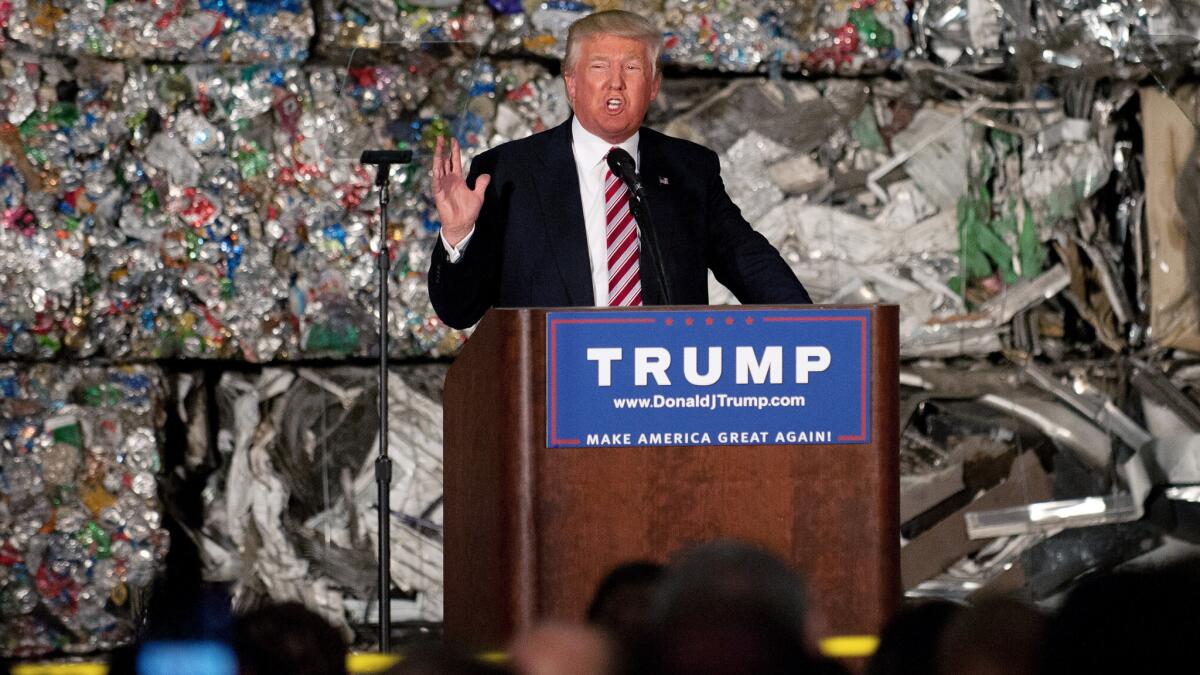Trump inspires supporters’ angst and anger over trade, but at what cost?

Reporting from Washington — Carole Ann Powers was shopping for stationery not long ago — she still likes to send handwritten notes the old-fashioned way — when she found herself turning over the box to read the fine print: Made in China.
The Donald Trump supporter says she took a pass, preferring to spend her money on American-made goods.
“Gosh, that’s how I feel: Bring the jobs back,” said Powers, the daughter of a steel worker, volunteering at Trump headquarters in Monroeville, Pa., earlier this campaign cycle. “We’ve lost everything. Even our Oreos,” she said. “I will not buy anything from any other country.… I don’t even care what the price is. ”
Trump has tapped into concerns about trade policies like few others in the Republican Party, giving fresh voice to an issue that has historically been the terrain of Democrats and their labor union allies.
Election 2016 | Live coverage on Trail Guide | Sign up for the newsletter
Pounding Bill Clinton’s record on trade, Trump has deepened a rift within the GOP establishment and put Democrats on defense.
“We’re better off paying a little bit more” for consumer goods, Trump said at a recent stop in Maine, as a way to protect American jobs.
But Trump is an unlikely champion of American-made products, critics say.
The powerful AFL-CIO union counter-punched with a video featuring Trump looking uneasy during a 2012 television appearance as David Letterman reads the “Made in China” and “Made in Bangladesh” labels on the backs of Trump ties and shirts.
And Clinton’s campaign fired back in a missive that “while Donald Trump has spent his career outsourcing jobs to other countries, Hillary Clinton has been fighting for American workers.”
The campaign trail conversation is unsettling to those who have been trying to elevate the trade debate.
“I find myself put in a strange position,” said Robert E. Scott, an economist and self-described “progressive Democrat,” whose work Trump often cites in his speeches.
“In one sense Trump is correct in his diagnosis that globalization has played a big role in the impoverishment of non-college-educated workers,” said Scott, who is director of trade and manufacturing policy research at the Economic Policy Institute.
“Trump blames it all on Hillary and Bill Clinton, but this has been a bipartisan policy — and one that has been supported mostly by Republicans.”
One of Trump’s main economic prescriptions, though — slapping heavy tariffs of up to 45% on imports from China and Mexico as a way to encourage American-made products — may result in more economic harm than good, economists say.
Tariffs would increase consumer costs but do little to bring back American jobs, according to experts, in part because imports would more likely come to the U.S. from other countries.
Republican mega-donor Paul Singer has warned that Trump’s economic policies could lead the U.S. into another recession, and Moody’s economist Mark Zandi sounded a similar alarm, that Trump’s trade proposals “will mean a smaller U.S. economy as the years go by.”
But the details do not seem to bother Trump supporters, especially those in hard-hit Rust Belt communities who have watched jobs and livelihoods disappear.
“Ask me why I’m here,” Powers said at the Trump headquarters before the Pennsylvania primary.
She pulls a visitor into a break room, drab with its pale walls and bare furnishings, and points to a yellowed photograph tacked to the wall.
“Northern Cambria Shirt Company,” the picture reads, with a handwritten addendum: “Now made in China.”
Powers worked at the factory after high school — her job was to trim the strings after cuffs and buttons were sewn onto the shirts. Later she glued soles onto shoes at another factory.
With her small children in tow, she decamped to Pittsburgh for what she hoped would be a better life working as a waitress. Now 68, she works the takeout window at a local diner.
Even though she didn’t like the factory jobs she left behind, she laments that they’re gone.
“I could cry,” she said. “The whole town wiped out of jobs.”
Twitter: @LisaMascaro
ALSO
In Colorado, conservatives grapple with the Trump conundrum
FBI interviews Hillary Clinton over her email use while secretary of State
How Tim Kaine went from ‘wild card’ vice presidential pick to shortlist favorite for Hillary Clinton
More to Read
Get the L.A. Times Politics newsletter
Deeply reported insights into legislation, politics and policy from Sacramento, Washington and beyond. In your inbox three times per week.
You may occasionally receive promotional content from the Los Angeles Times.











